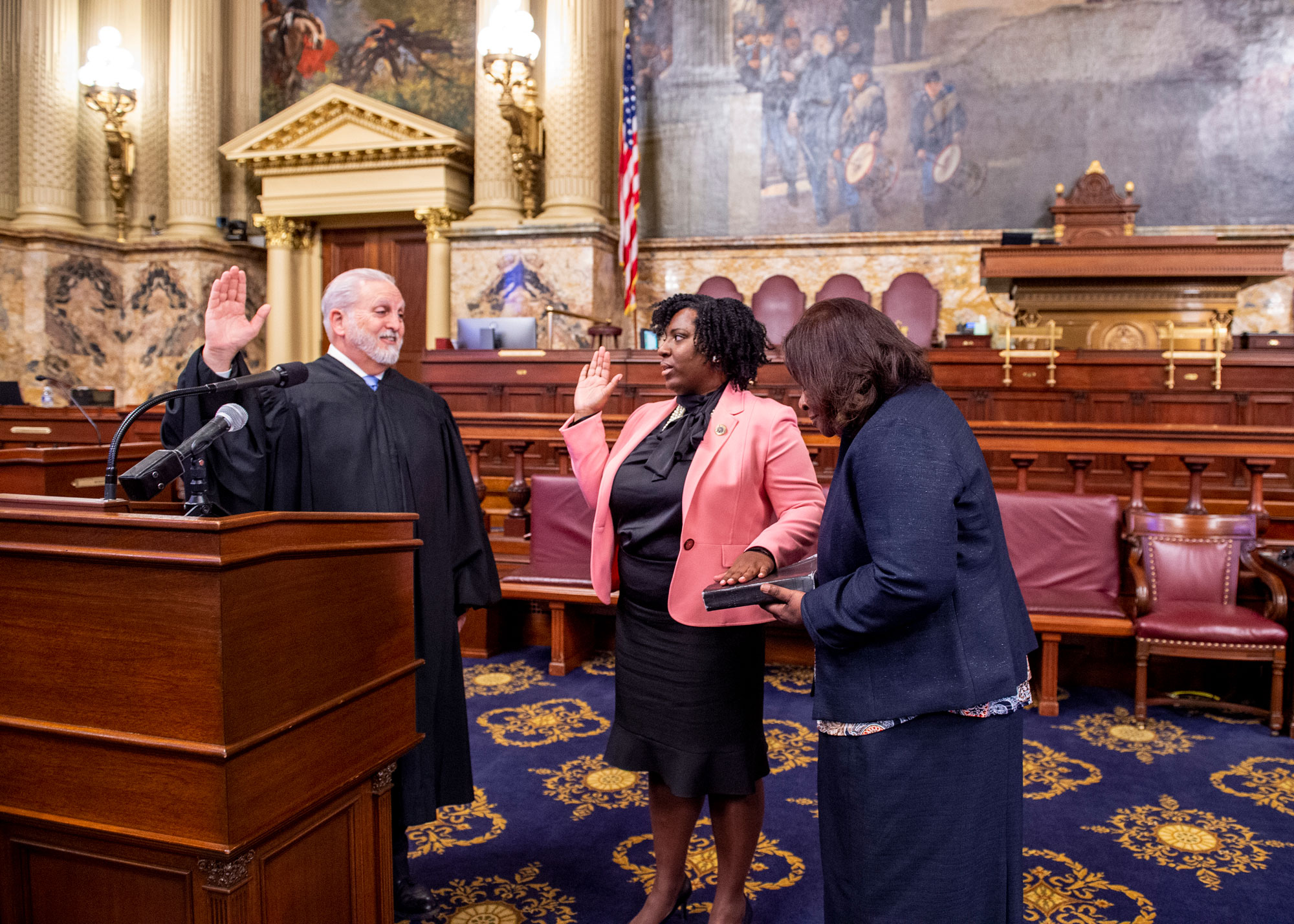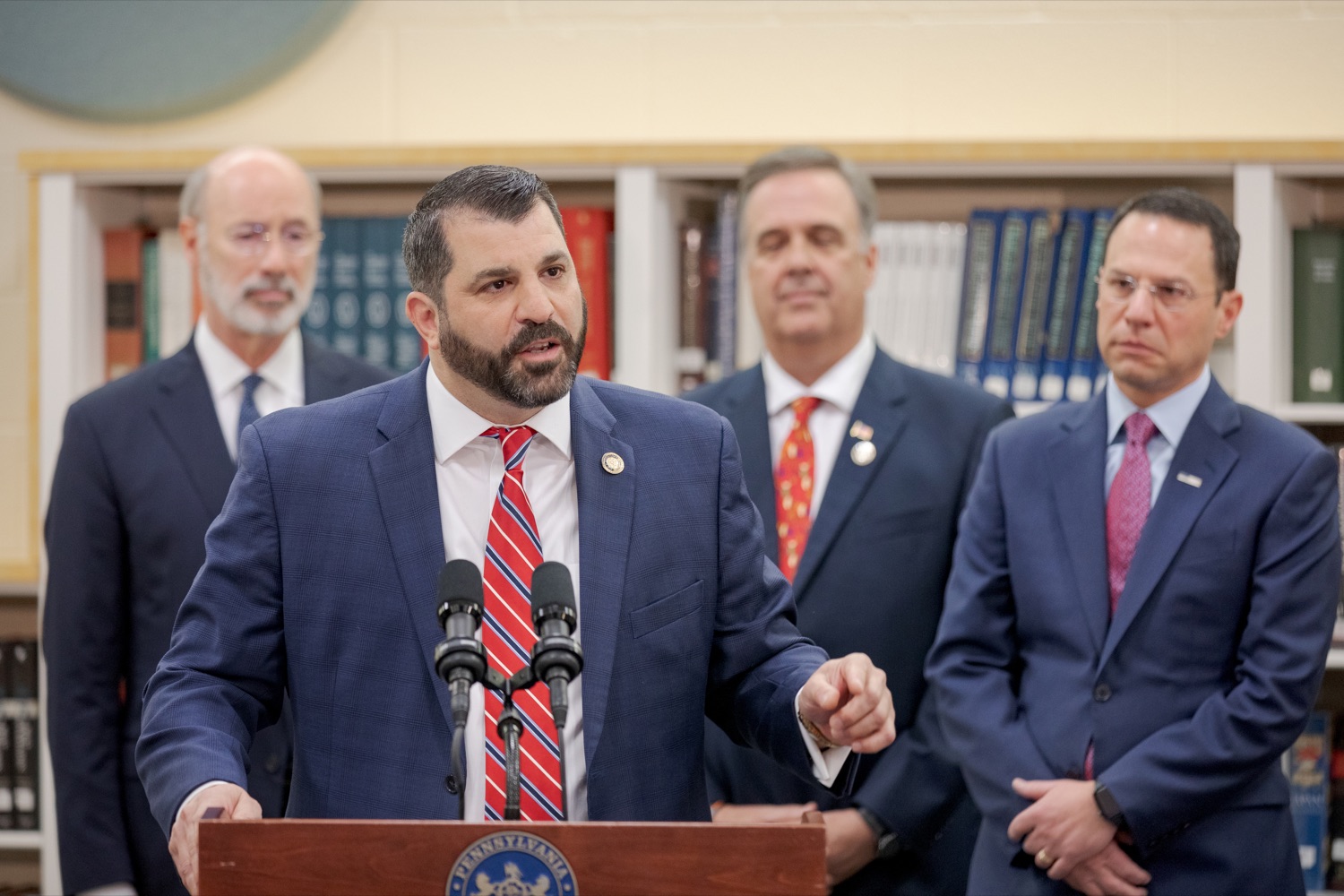News & Politics
City & State’s Year in Review
Remembering the remarkable events and people from a landmark year.

Kim Ward, Joanna McClinton and Cherelle Parker Amanda Berg; Pennsylvania House Democratic Caucus; People for Parker Campaign
The year 2023 is one we won’t soon forget. Women from across the commonwealth made history, shattering glass ceiling after glass ceiling, winning major elections in Pennsylvania’s most-populated counties. Democrat Cherelle Parker became the 100th and first female mayor of the city of Philadelphia, while Sara Innamorato also became the first woman elected Allegheny County Executive. Meanwhile, Gov. Josh Shapiro took office at the beginning of the year, looking to bring his campaign goals to fruition and successfully navigate through a divided General Assembly.
There’s also the matter of education, with the state’s Commonwealth Court giving lawmakers a new assignment: fix the state’s unconstitutional education funding system. That court ruling prompted lawmakers to schedule a statewide tour to hear from communities about how to address education.
Then there were the things we just didn’t expect: Berks County state Rep. Mark Rozzi's quick tenure as speaker of the Pennsylvania House, a state budget stalemate centered around school vouchers and the apparent demise of the commonwealth's effort to reduce carbon emissions from the power sector.
It was quite a year in the commonwealth, and City & State has gathered some of the highlights, lowlights and surprises from a very unique 2023.
The Year of the Woman
GOP state Sen. Kim Ward kicked off the year by adding a little more to her resume when she was sworn in on Jan. 3 as the first female Senate President Pro Tempore in Pennsylvania history. That set the tone for several other female firsts that were to come throughout the year.
The next was Pennsylvania Supreme Court Justice Debra Todd, who was sworn in as Pennsylvania’s 58th Chief Justice on Jan. 20 – becoming the first woman to hold the role of chief justice in the court’s 300-year history. “It means the world to me to take the oath like so many distinguished jurists before me, while forging new ground for women and reaffirming my commitment to support, obey and defend the Constitution of the United States and of this commonwealth,” Todd said in a statement on the day of her swearing in.
On Feb. 28, on the other side of the state Capitol, House lawmakers voted to elect Philadelphia Democrat Joanna McClinton as Speaker of the House. In the process, McClinton became the first woman and first Black woman to be elected speaker.

Looking back on the year, McClinton told City & State she was proud of the chamber’s work to pass legislation expanding the state’s Property Tax Rent Rebate Program, as well as a bill that requires insurers to cover all costs for one supplemental breast cancer screening each year.
“It has been a really incredible year for our chamber to have such a change in both political party control and, for the first time, to have an opportunity for a woman to lead the chamber. It's been exciting, challenging, but also very tremendous. We've done a lot of good work all year getting good bills over to the Senate, some of which of course, have made it across the finish line,” McClinton said.
“We're still at it, trying to continue to improve the lives of Pennsylvanians – fighting for better schools, safer communities and better jobs,” she said.
More history was made in the latter half of 2023, when, on the same night, voters in Pennsylvania’s two most-populated counties elected women to lead top executive offices – for the first time. In Allegheny County, voters powered Innamorato to victory in the race for Allegheny County Executive, making her the first woman to hold the role, and in Philadelphia, Parker became the first woman elected to the office, as well.
The opportunity and gravity of becoming Philadelphia’s first female mayor was not lost on the Democratic candidates who had an opportunity to etch their place in the city’s history.
Both women will seek to use their lived experiences to inform the policy that comes out of Allegheny County and Philadelphia. Parker, after all, made that a central message of her campaign.
“I wouldn’t allow anybody else to attempt to weaponize my humble beginnings against me,” Parker said during her election night remarks in November. “Before they could do it, I made sure that I told you that I was born to a single, teenage mother, that I was raised by my grandparents, that my grandmother collected welfare and subsidized food to take care of me … I needed people to know that my real life – lived experience – was closest to the people who are feeling the most pain right now in our city.”
Shapiro’s first year
After a strong victory in the 2022 gubernatorial race, Gov. Josh Shapiro took office on Tuesday, Jan. 17, promising to write a new chapter for Pennsylvania.
“With my feet firmly rooted in ‘We The People’ of Pennsylvania, with my heart open to others, and my eyes fixed ahead, I'm prepared now to do my part to move our commonwealth forward,” Shapiro said during his inaugural address. Shortly after taking office, the Democratic governor signed several executive orders, including one that eliminated four-year degree requirements for thousands of state jobs, and another that creates an office aimed at improving the state’s digital services.
Surrounded by Democrats and Republicans on May 1, Shapiro signed his first bill into law, which eliminated out-of-pocket costs for breast cancer screenings and testing for women at a higher risk of getting cancer. “We can give more women the tools that they need to make informed choices over their health care,” Shapiro said at the bill signing. “I want you to know that's a really big deal.”
 (Photo by KENA BETANCUR_AFP via Getty Images.jpg)
The governor also received praise for his administration’s response to the collapse of a portion of Interstate 95 in Philadelphia after new, temporary lanes were reopened within 12 days of the June collapse.
Shapiro also faced some headwinds during his first year in the governor’s office, including a months-long budget stalemate over private school vouchers, as well as the exit of his top legislative affairs staffer following sexual harassment claims. Mike Vereb, Shapiro’s secretary of legislative affairs, abruptly resigned on Wednesday, Sept. 7 – and reports quickly revealed that Vereb was facing a sexual harassment complaint at the time of his departure. Spotlight PA later reported that Shapiro’s office used $295,000 in taxpayer funds to settle a sexual harassment claim against Vereb.
As for the budget stalemate, that erupted in June after Shapiro vowed to line-item veto funding for private school vouchers – a measure he previously supported – prompting Senate Republicans to hold off on sending the bill to Shapiro’s desk. Tensions later cooled as the months went on; lawmakers and Shapiro were able to complete the budget in December and reach agreement on a wide-ranging package of criminal justice bills.
After Shapiro signed a $45 billion budget bill into law, he also signed an expansion of the state’s Property Tax Rent Rebate Program, which not only increases the number of Pennsylvanians eligible for the programs but expands the maximum allowable rebate to $1,000 for eligible recipients – fulfilling a key campaign promise from the governor.
Existential education crisis
The state’s Commonwealth Court played a major role in shaping the future of Pennsylvania’s education system in 2023, with President Judge Renée Cohn Jubelirer issuing a 778-page ruling in February that reverberated through the commonwealth.
The court’s findings were clear: the respondents of the lawsuit – the legislative and executive branches of state government – “have not fulfilled their obligations to all children under the Education Clause in violation of the rights of Petitioners,” the ruling read. The order also stated that “students attending low-wealth districts are being deprived of equal protection of law” as a result of educational disparities between high-wealth districts and low-wealth districts.
In short, the court tasked lawmakers with fixing an unconstitutional school funding system, offering few suggestions for how to do that.
“The Court is in uncharted territory with this landmark case,” the opinion reads. “Therefore, it seems only reasonable to allow Respondents, comprised of the Executive and Legislative branches of government and administrative agencies with expertise in the field of education, the first opportunity, in conjunction with Petitioners, to devise a plan to address the constitutional deficiencies identified herein.”
The ruling prompted lawmakers from both chambers to launch a statewide tour to hear from educators and stakeholders about how to move forward in light of the court’s ruling. But while the process of fixing the funding system is currently ongoing, there was other action on the education front this year.
As part of the budget impasse, lawmakers struggled to find enough consensus to advance state funding for four state-related universities, and the bill ultimately reached the governor’s desk five months after the June 30 budget deadline had already passed. That bill increased funding for Lincoln University by 21% and boosted Penn College of Technology funding by 12.1% – but flat-funded allocations for Pennsylvania State University, the University of Pittsburgh and Temple University.
Meanwhile, at press time, Pennsylvania’s 15 community colleges are still waiting for their state allocations, forcing some to start drawing from reserves, according to the Pittsburgh Tribune-Review.
Expect the unexpected
Historic firsts and Shapiro’s first year took up much of the political oxygen statewide, but there were plenty of other unexpected happenings throughout the year.
Who could forget the rise of state Rep. Mark Rozzi, a Berks County lawmaker who was unexpectedly elected speaker in January and quickly promised to break the chamber’s gridlock – not to mention pass a stalled policy that would allow some child sex abuse survivors to file civil lawsuits against their abusers. Rozzi’s time as speaker even coincided with a call from outgoing Gov. Tom Wolf to convene a special session to advance the policy, which would give survivors for whom the statute of limitations has timed out a temporary window to sue their abusers. Ultimately, House lawmakers passed two measures during the special session, one constitutional amendment and one statutory bill, both outlining a process for survivors to file civil suits against their abusers.

However, the state Senate never convened to advance the bills in a special session, and the status of the proposal is still up in the air. Rozzi, a Democrat who pledged to lead the chamber as an independent, resigned as speaker on Feb. 28, paving the way for McClinton’s election.
Another surprise in 2023 was the Commonwealth Court’s rejection of Pennsylvania’s effort to join the Regional Greenhouse Gas Initiative, a multistate effort to cap and reduce carbon emissions from power plants. The court ruled in November that Wolf’s effort to regulate carbon emissions through a cap-and-invest structure “constitutes a tax that has been imposed … in violation of the Pennsylvania Constitution.” The court enjoined the state from implementing the carbon regulation, and Shapiro’s administration said it will appeal the ruling, despite the governor not fully endorsing the plan himself. Something tells us there will be more news on RGGI in the next year.
There were some presidential appointments in 2023, as well, with two prominent Pennsylvania officials being named to President Joe Biden’s Presidential Advisory Commission on Advancing Educational Equity, Excellence, and Economic Opportunity for Black Americans. Democratic state Rep. Malcolm Kenyatta was named chair of the commission, while Chad Dion Lassiter, the executive director of the Pennsylvania Human Relations Commission, will also serve as a member of the 21-member commission.
The year ended with a strong performance from Democrats, who swept races for seats on the state’s appellate courts. But with the presidency, a U.S. Senate seat and plenty of other races on the line, what happens in 2024 – a year that promises to be another historic one in Pennsylvania’s political history – is anybody’s guess.
